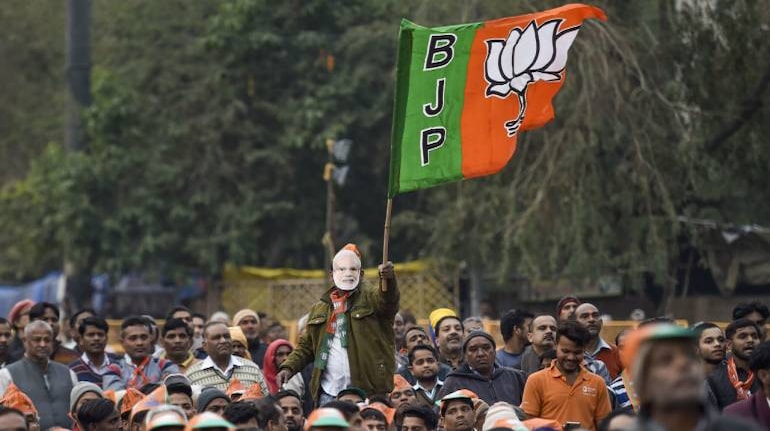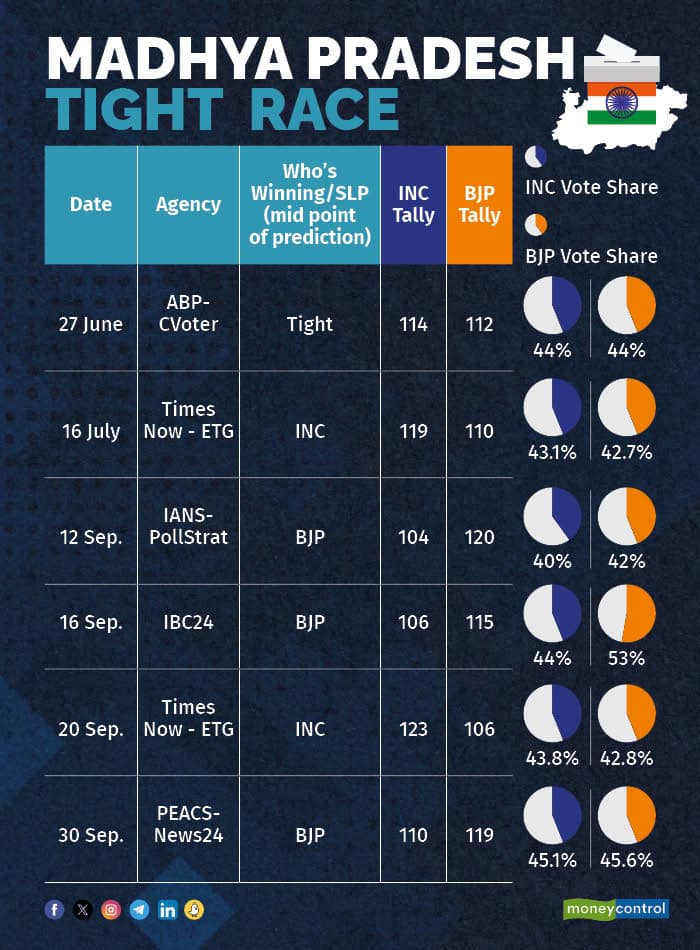



The Bharatiya Janata Party has surprised political pundits, strategists and even the candidates themselves by fielding three central ministers and four Members of Parliament in the election fray in Madhya Pradesh. Political circles are abuzz with speculation that the party could repeat this experiment in the other poll-bound state elections as well.
While Congress is terming this move as an indication that the party is struggling to retain power in the state that it has held for almost 20 years on the trot, except for the brief stint by Kamal Nath (2018-20), BJP supporters are hailing it as a masterstroke which would propel party’s fortunes in the state.
Early opinion polls suggest a tight race in Madhya Pradesh, a repeat of 2018 verdict.

So, why is the BJP fielding ministers and MPs:
1) A Test Of Popularity
The general elections are due early next year and the party is likely to decline many MPs a renomination. Recall that a staggering 35 percent of sitting BJP MPs were denied tickets in 2019.
There is no better way to check their popularity than to let them contest one of the Vidhan Sabha segments of the Lok Sabha seat they represent. If they lose, they are out of contention in general elections.
2) Activate Cadre, End Factionalism
The Madhya Pradesh BJP unit has been witnessing immense factionalism. It has many camps of strong leaders like Shivraj Singh Chouhan, Narendra Tomar, VD Sharma, Narottam Mishra, Jyotiraditya Scindia, Kailash Vijayvargiya etc. The rumours of Shivraj not being repeated as Chief Minister if the party wins has sharpened the war between leaders.
The party hopes allotting tickets to tall leaders will motivate their key men and resources, and activate cadres in support of these leaders ending factionalism at local level.
3) Force Tall Leaders To Campaign
Many tall leaders were not coming out and campaigning for the party in their areas. The central leadership has given a clear diktat, work like a karyakarta, forget roaming in “helicopter”, take responsibility in a tight election and prove your worth.
Kailash Vijaywargiya’s statement sums up the attitude of leaders, "I had no desire to contest, not even 1 percent. I am a senior leader now, will I now ask for votes with folded hands? I had thought I would give speeches and leave. I had planned eight public meetings — five by helicopter and three by car.”
4) Strengthen Party In Weaker Regions
The party in 2018 had lost a considerable number of seats to Congress in Malwa (-13), Mahakaushal (-11) and Gwalior-Chambal (-13). Fielding Tomar will give strength to the party in Chambal, Vijayvargiya in Malwa and Rakesh Singh in Mahakaushal. BJP had done well in Vindhya in 2018 and the announcement of Riti Pathak will help to consolidate votes in the region.
5) Play OBC Card, Neutralise Uma Bharti
The Congress party has been making caste census an election issue and targeting BJP for not including OBC reservation in the Women’s Reservation Bill. Even former CM Uma Bharti has been very critical of the party's move to ignore the OBC womenfolk.
The party by putting up Prahlad Singh Patel, Union minister, as a candidate is giving a strong message to the OBCs specially Lodhi community from which Uma Bharti hails, thus killing two birds with one stone, neutralising the OBC card and taming fiery Uma.
6) Strengthen Party’s Prospects In ST belt
Congress had made significant gains in the ST reserved seats in 2018. BJP’s tally had reduced by half to 16 from 31 in 2013. By announcing Faggan Singh Kulaste as candidate from Niwas in Mandla, the party hopes to reverse the trend amongst the ST community which accounts for 21.1 percent of the state population.
7) Making BJP battle ready for a seat by seat contest
A party which prides itself on seeking votes in the name of the Prime Minister, exhorting the voters to even forget the candidate, has suddenly found new vigour in declaring tickets early to give it a first mover advantage and stun the opposition.
After Himachal (2022) and Karnataka verdicts (2023), and analysing the state election results of 2018 where BJP lost in all four big states, this is an acknowledgement by BJP that the Vidhan Sabha election is a lot about the local candidate. CSDS surveys reveal that on an average 39 percent voters cast their ballot keeping in mind the candidate, 35 percent party and only 21 percent state/central leadership in these elections.
MP is a seat-by-seat election with BJP pushing Shivraj to the background, promoting collective leadership, and declaring candidates early (including heavyweights).
Will it work or not? As per C-Voter Political Stock Exchange, 63 percent NDA supporters feel this could actually increase groupism and increase lobbying for CM position. But 58 percent of the total respondents feel that this strategy would somewhat/very well help the BJP in state polls.
Amitabh Tiwari is a former corporate and investment banker-turned political strategist and commentator. Twitter: @politicalbaaba. Views are personal, and do not represent the stand of this publication.
Discover the latest Business News, Sensex, and Nifty updates. Obtain Personal Finance insights, tax queries, and expert opinions on Moneycontrol or download the Moneycontrol App to stay updated!
Find the best of Al News in one place, specially curated for you every weekend.
Stay on top of the latest tech trends and biggest startup news.